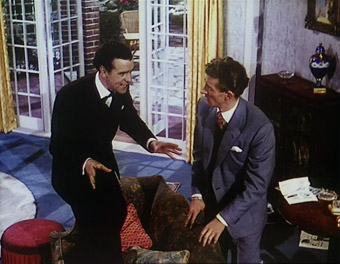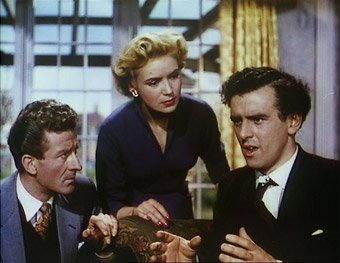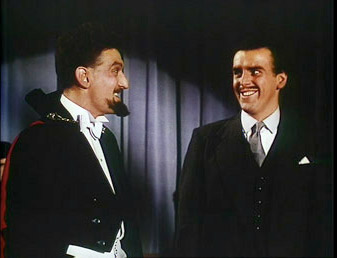'Henry's sleeping'
'Where?'
'In the bedroom'
'You make the very words sound disgusting!' |
Charlie failing to win over Henry's mother-in-law |
Will Any Gentleman...? is Vernon Sylvaine's adaptation of his own play for the screen. George Cole stars as Henry Sterling, a henpecked bank clerk who lives a dreary existence in suburban London. After a mix-up at a music hall, he finds himself onstage with ambiguously foreign magician Mendoza, who hypnotizes him into losing all of his inhibitions. George's rampaging id leads him to flirt outrageously with any woman who walks past him, give away money at the bank and accidentally steal £300 from his manager's safe – leaving the stage set for a farcical finale.

The emphasis being heavily on 'stage'. The importance of the play in contemplating the film is huge. Having not seen the original production it is impossible to say how close the adaptation is, but there is an undoubted theatricality weaved into the design, script and aesthetics here that sometimes uplifts the film, at others undermines it, but is doubtless a constant presence.
The plot is a brilliant farce, starting as a simple Jekyll and Hyde story before adding more characters, plot twists and mistaken identities and becoming a complicated comedy-of-errors. The first real development occurs on a stage (where else?) as Henry is dragged up and hypnotized. Unlike what we've come to expect from hypnosis as a plot device, there is no trigger for Henry's regression into his liberated state. He switches between mild-mannered and raving libido whenever the plot demands it – although this allows for an element of unpredictability, it also feels incredibly contrived at times; when Henry's mother-in-law visits for example, we know instantly which mode Henry is going to adopt. As more layers are added to the plot, the film seems to shut down and for the second act feels very much like a revolving door of characters who enter, make the situation more complicated and then leave. This second act is entirely confined to Henry's house, with a dominant angle being a front-on mid-shot showcasing the front door – a stage door through which the actors can enter and exit, adding to the sense of the film being nothing more than a recorded play.
The characters that crash in and out of the scenes are something of a mixed bag, Sylvaine relying on broad types who can occupy little screen time but have significant plot impact; so we have a flirty housemaid, a hawkish police detective, and a mean bank manger in addition to the aforementioned mother-in-law. Few of the characters are developed in any real way, except for Henry and to some extent his brother Charlie, but then again they don't need to be – part of the joy of watching a film like Will Any Gentleman...? is in seeing the mayhem of well acted, convincingly written character types muddle about and smash into each other like dodgem cars. Its only when all of the characters are gathered together for the final scene that you realize how economically they are presented, each of them leaving a lasting impression. The plot is so shamelessly put together, with everything being tied up nicely at the end in true farce style, that its impossible not to be won over. The result of the farcical plot produces some hit-and-miss gags and routines that run a touch too long, but there are some genuinely funny moments drawn from the dialogue; my favourite being Charlie's cry of 'Henry don't – it's a genuine imitation!' as Henry threatens to break a valuable vase.

With such a busy script, a deliberate decision appears to have been made to pare down the visual aspects of the film in order to keep things simple. Director Michael Anderson favours depth for most of the production, keeping his actors at the front of the frame, for the majority of the time in two-shots and mid-shots, and constantly reframing around them as they move. The effect is to turn the frame of the camera into something like the arch of a theatre, with the set extending back into the frame as opposed to either side of it. Everything feels incredibly narrow. There isn't a lot of editing within rooms, so the scenes can tend to feel quite long, although the frenetic pace of the screenplay and speedy dialogue prevents the film from dragging. Interestingly, when Henry regresses into his hypnotic state the camera suddenly becomes more lively, the editing pattern picks up and Henry freely moves in and out of frame, escaping the confines of the imposed theatricality. During the film's climactic act, taking place backstage at the local music hall with little in the way of dialogue, the film takes a much more cinematic turn as the characters duck in and out of changing rooms, run onstage and hide from each other ('looking in the wrong door' gags are abundant). This increase in action necessitates a greater number of set-ups, angles and cuts – you can feel the film breathe a sigh of relief.
The cast is drawn from a pool of faces, some of whom would have been familiar to audiences of the period, others who would go on to become famous. George Cole as Henry is very good, being suitably sweet and helpless when in control of himself, but turning into a sexual menace when his inhibitions are lost (its a surprise that his leery attempts at chatting up a blonde bank customer aren't met with pepper spray). Cole acts with a degree of authority that means we never lose sympathy with Henry, even if after his more repulsive moments. Jon Pertwee puts in a brilliantly camp performance as Henry's rakish brother Charlie, flourishing about the set and flicking his wrists at every opportunity. Joan Sims, Sid James, William Hartnell and Alexander Gauge contribute with typical skill and efficiency, the latter in particular stealing the show with his blusterous, red-faced performance as 'Director in Chief of all the bank's affairs'. Veronica Hurst as Henry's wife Florence is a little bland, but then again, so is the character; James Hayter as Dr Smith is downright creepy. Overall its a fantastic cast and the film would be poorer without it; they make the most of limited screentime, utilize all of the room for extravagance afforded to them by the material and ensure that the characters are effective.
Will Any Gentlemen...? is an adaptation that manages to maintain a certain level of energy throughout its running time. Although the main premise may be a little tired, the witty dialogue and superb acting keep the pace up despite the stilted direction and the occasional dud routine. For the most part its essentially filmed theatre, but that is no reason for it to be dismissed out of hand.
A reasonable 1.30:1 transfer whose colour rather charmingly dates the film as much as anything in the content. The contrast is a little harsh, however, losing shadow detail in darker areas and burnings out some of the highlights, something particularly noticeable in darker scenes or when there is a lot of white in the picture. The print has been cleaned up but a little dirt still remains. Detail is rather good.

The Dolby 2.0 mono soundtrack is clear enough with the expected limitations on dynamic range, but there are no real issues to report.
None. Disappointing, but material on the film is thin on the ground so this is understandable.
An enjoyable picture of the Sunday afternoon variety, bolstered by some great performances and a fine screenplay. For fans of wordy, farcical comedy and this is well worth a look, others my find the style to stilted to really appreciate.
|